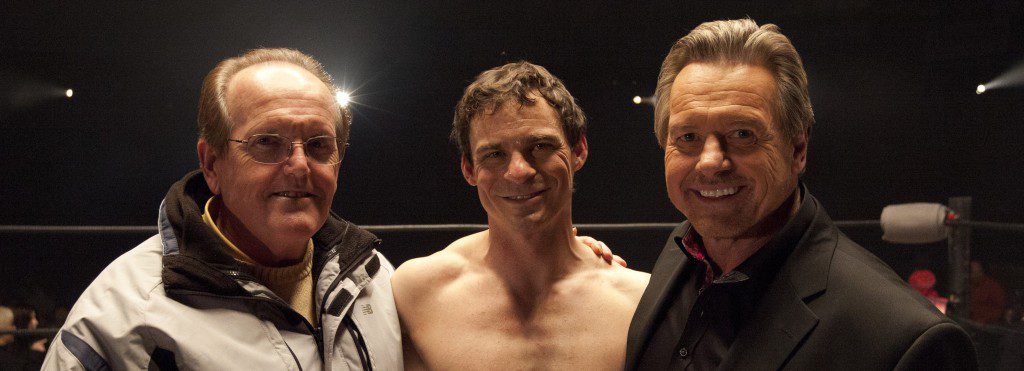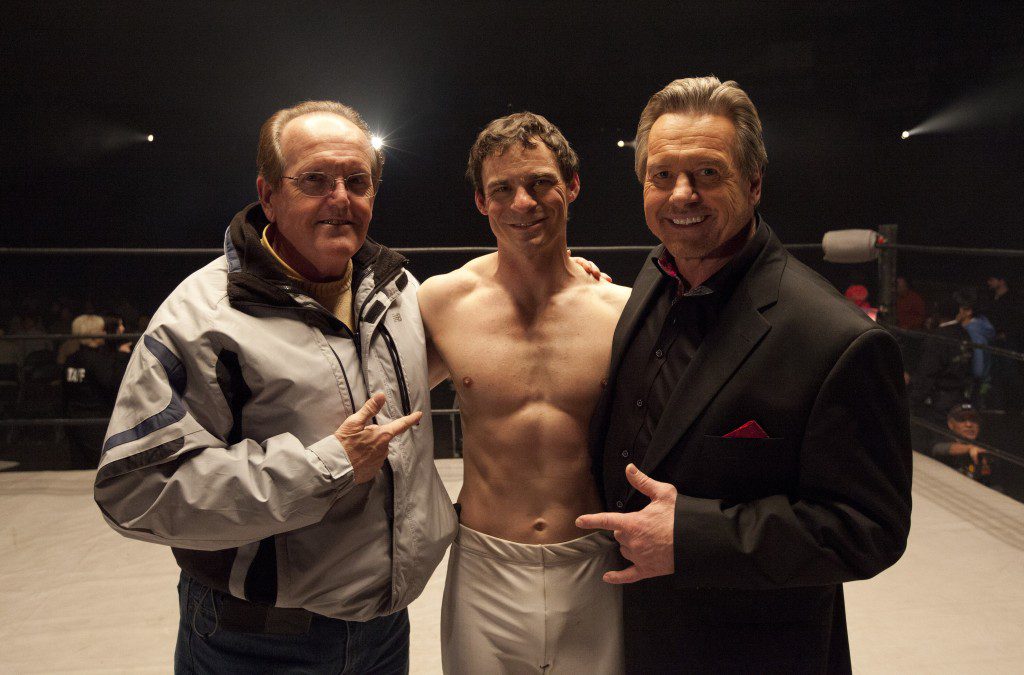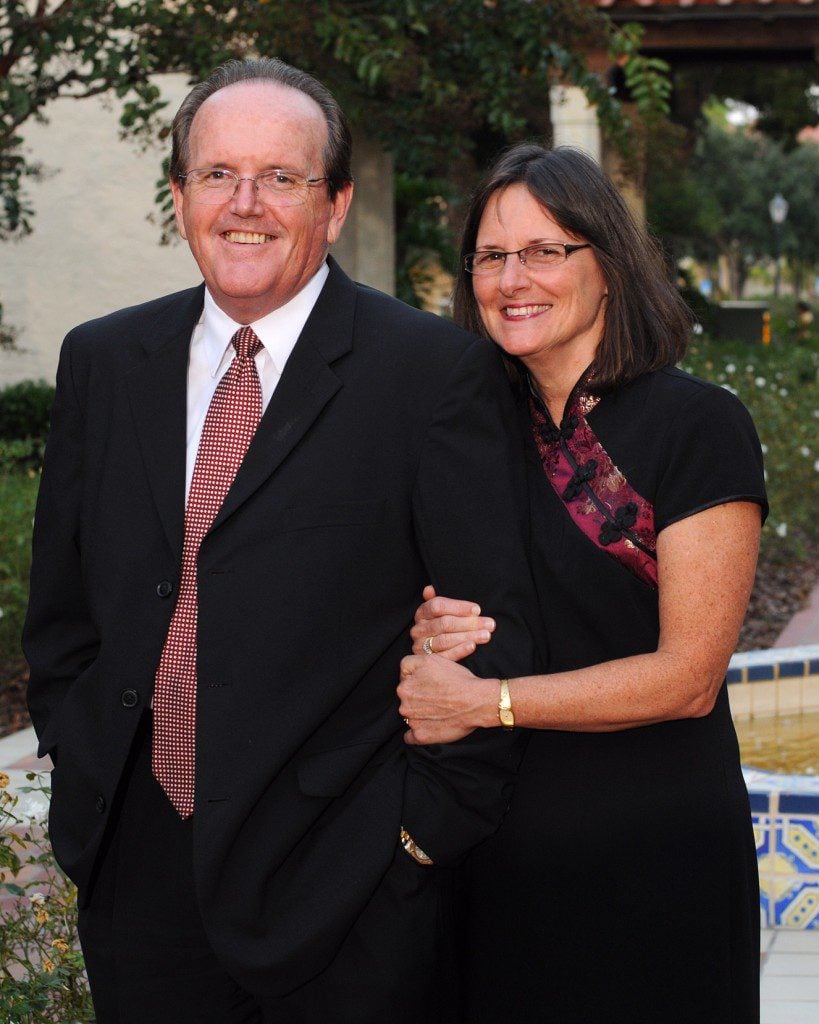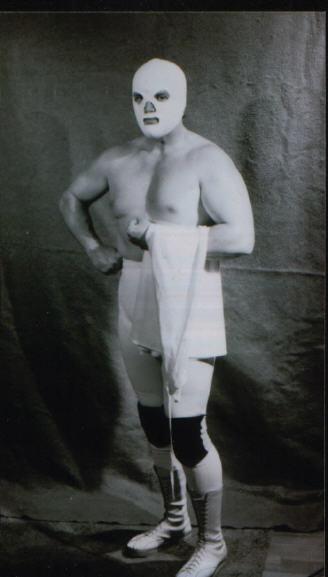A pro wrestler becomes a pastor, and the pastor becomes a masked vigilante, in The Masked Saint, which opens this Friday (January 8).
The film is based on a novel by Chris Whaley, a Southern Baptist minister who was, himself, a professional wrestler before he turned to the pastorate, and parts of the novel, in turn, are based on Whaley’s own life story: among other things, he continued wrestling, under the name ‘The Saint’, even after he became a pastor.
The film also marks one of the last big-screen appearances of “Rowdy” Roddy Piper, a pro wrestler turned actor who passed away suddenly last summer of a heart attack caused by a pulmonary embolism. (The photo above shows, from left to right, Whaley, actor Brett Granstaff, and Piper on the set of The Masked Saint.)
I spoke to Whaley just a few days before Christmas about the mix of fact and fiction in the movie, what it was like to see his story on the big screen, and what it was like to see Piper again on the film’s set so many years after meeting him in the ring.
What follows is a slightly edited transcript of our conversation.
–
This is not a true story, as I understand it. This is based on a novel that you wrote?
Whaley: It’s based upon true events.
What mixture of fact and fiction– I mean, that’s a big question, but I know that you are a pro wrestler who became a pastor. Did you also do the masked vigilante thing?
Whaley: When I went to my first church, I had a young lady that would come in late — she’d be the last person to come in and be the first person to leave, and she dropped her children off — and one Sunday she came in with sunglasses on, and she stayed until the end of the service, and then she was the last person out, and she took my hand and I could see the tears coming down her cheeks.
So I raised her sunglasses and she had two black eyes, and it infuriated me that a man would hit a woman — it takes a real dirtbag to hit a woman — and so I told her I was going to go see her husband, and I did. I went to see him, and said, “Let’s see how you do against somebody who can fight back.” Bullies only pick on people that they know they can beat up, or they know they can abuse, and bullies just really bother me.
So that was the first incident that happened, and it just seemed like, over my course of ministry, I just had one thing after another that seemed to happen like that. So when I wrote the book, each chapter is actually based on something that happened in my life. But is there some fiction involved in each chapter? Yeah, there is. I did put in some fiction in each chapter, but each chapter was based upon a true event in my life.
And were you wearing a mask during these encounters, or did people know who you were?
Whaley: No, no, I did not. I did not.
Okay. When you got into pro wrestling, were you already a Christian at that point?
Whaley: Yes I was. Yes I was.
And was there any debate or controversy over that? There’s a lot of movies about Christian track-and-field types and Christian football players and that seems to be okay. Was there any controversy or debate around Christian wrestlers?
Whaley: I didn’t think so. I think it was a story of good versus evil, with good coming out on top, as long as I did the very best that I could do, with my job as a professional wrestler, then I felt that I was doing a good job. It gave me so many opportunities to share my faith with people, because there’s not a lot of professional wrestlers who are also ministers, so I would never be able to give enough thanks for the opportunities that it gave me to share my faith with anybody. But I don’t see professional wrestling as different than any other sport, as far as the athleticism of it.
Now, you’ve got to remember, this was 30 years ago, and wrestling has changed quite a bit. Today there’s a very dark element to it. We didn’t have that. When I was in wrestling 30 years ago, it was the good guy against the bad guy, and most of the time the good guy won. And if the bad guy did win, it was to build up for another match where the good guy would win. That’s a lot different than it is today. Today it’s a full-blown drama with a lot of darkness in it, and I don’t like wrestling today. I much prefer it from my time.
When you said it’s a story of good versus evil, you’re talking about the narrative that the wrestlers are playing out on the mat, basically.
Whaley: Right, right.
Did your being a wrestler overlap with your being a pastor at all, or being a theology student?
Whaley: Yes. I was a youth pastor, and my wife was pregnant with our first child, and I went to the pastor of the church and said, “I could wrestle a couple of nights a week, and it would really help my family financially,” and the pastor said, “Absolutely not, we’re not going to turn this church into a circus.” So I said, “Okay,” but later I was watching wrestling and I saw a friend of mine who worked under a mask, and I thought, “Well that’s it! I could work under a mask, and nobody would know who I was! It wouldn’t create a problem!” So that’s how ‘The Saint’ was born. I changed everything and started wrestling with a white mask and white tights and white boots, and I became ‘The Saint’, and I was wrestling, and nobody knew it.
Did any of the kids in the youth group know that their pastor was in the ring?
Whaley: No, they did not. Now, I had a lot of bumps and bruises, and when I would show up at church and someone would say, “Man, what happened to you?” I would say, “I fell down.” That was the truth, I fell down — but I had a lot of help doing it!
The other incident you were talking about earlier, where you were helping people, were you still a youth pastor then, or was that in your senior pastor days?
Whaley: No, that was when I was a senior pastor.
You mentioned that the book has some fiction built into it. Can you comment on translating the book into the film and any further changes that might have been made there? Is the film even more fictional, or is it still fairly close in some ways to what you went through?
Whaley: No, the film is based upon true events. Of course, there were some changes made. I don’t think I’ve ever read any book where the movie was exactly like the book, there’s always changes. One of the big changes is, in my book, there’s a very precious older lady to me by the name of Ms Edna, who is played by Diahann Carroll in the movie, and she’s from my childhood, but in the movie they brought her up to real time. So that’s one of the changes. There’s an incident that is shown in the movie that takes place on the basketball court, but in the book and in real life, it took place on a softball field, but they changed it because it was easier to film inside than outside, because it was November in Sault Ste Marie, and it was very cold, so they filmed it inside, using the basketball backdrop rather than the softball.
Are you referring to the scene where the pastor puts the church member in a sleeper hold?
Whaley: Right.
That actually happened? You actually put a member of your own church in a sleeper hold?
Whaley: No, that’s not the way it took place in the book. In the book, I knocked him out.
Oh my. Okay.
Whaley: Well, the title of the chapter is ‘The Hypocrite,’ and I put up with this guy for about five years, and all he did was cause a lot of embarrassment to our church. He owned a business, and when somebody visited our church and they filled the card out, I would always go visit them, and very often when I would visit those people, they would say, “The guy who owned that business on the corner, I saw him in church, is he a member of the church?” And I would have to say, “Yes sir, he is,” and they would say, “Well, we won’t be back.” So I would go down and I would see that person, and I would say, “Let me tell you about a visit that I just made,” and I confronted him and I told him that his testimony was hurting the church, and he would just become belligerent. When we had business meetings at the church, he would come up and say things to me.
So I literally put up with it for five years, and we were playing softball, and the game was over, and we lost — and really, we lost because of him, but he never took any responsibility for his actions, and he was blaming it on somebody else — and he got very loud, and you know, it was church league softball, and finally I kind of snapped, and I said, “Why don’t you just shut your mouth?” And he said something else to me, and then he ran towards me, and when he ran towards me, it was just like a reaction. It was just a —
Like an instinctual reaction.
Whaley: Yeah, yeah, it was just instinct. I responded, and so I knocked him out. And when he woke up, he was talking about how he was going to get me fired.
When I got home, I called the chairman of deacons, and I told him what I had done, and I said, “I need to resign from the church, and I’ll do that.” We also had about six retired pastors in our church, so I said, “Get one of the retired pastors to preach.” He called me back in about an hour, and he said, “I talked to all the deacons, and they don’t want the retired pastor preaching, they want you to preach. And they said we’ll meet tomorrow afternoon and try to work this out.”
So that Sunday morning– We had two services, we had an 8:30 and an 11:00 service, so at the 8:30 service, the guy I hit was there in the service too, and he was chomping at the bits, and when it came time for me to preach, I just couldn’t do it.
I walked down, in front of the congregation, and I said, “I’ve heard of people giving the Lord’s work a bloody nose, but I never thought I would be one of them. But I did.” I said, “Yesterday afternoon, I did something very bad. I hit a member of this church,” and I said his name, I called his name and I pointed to him, and I said, “Even though he’s one of the most reprehensible human beings I’ve ever met, that was still no reason to do what I did, and I’ve asked God to forgive me,” and I looked at him, and I said, “I’m asking you to forgive me,” and I asked the congregation to forgive me. I said, “I’m a human being with a lot of flaws, and I’m not perfect, so I made a bad mistake, so I’m sorry, and I’m going to meet with the deacons this afternoon, and I’m going to do whatever I can to make this right.” And so then I got up and I preached. And during the invitation, that guy came forward and apologized to me.
But when we had the second service, at the 11:00 service, I had to do the same thing all over again. And the service was packed, at that service! I guess the word got out. So I stood again, and I said everything that I said at the early service, and I said, “Well, I couldn’t preach without you knowing what I had done.” And I turned around and started to walk up to the platform, and a guy on the second row stood up, and he said, “I think we should stand in support of our pastor.” And the whole congregation stood up and applauded.
So I was driving home with my wife that day, from church, and I said, “I don’t know of another pastor in the state of Florida who could knock a member of the church on his rear end and get a standing ovation.” But I did.
It seems to me that in the film, there’s sort of an ambiguity around whether the vigilantism is a good thing or a not-good thing. On the one hand, the pastor who intervenes comes across like an answer to prayer — some of the victims he’s helping were praying for help — but on the other hand, there is that cop investigating, and there is that sense that he shouldn’t be taking the law in his own hands. Where do you come down on that?
Whaley: I think that, as Christians, sometimes we stand on the sidelines when we see people being abused, and rather than become involved — rather than do anything — we just stand on the sidelines. And I don’t think God ever stood on the sidelines. So I think that the church should do all that it could to help people who are being abused, so I don’t think I did anything wrong.
But what if somebody saw this movie and was inspired to do something similar? Would that be advisable, do you think?
Whaley: I don’t think that they will get that from the movie. I think one of the things that they will get from the movie is the fact that we should be doing to help those who are inside of our churches, the people that need help that don’t get help — I think they’re going to get that message. And I also think they’re going to get the message that we serve the God of the second chance, that if you’ve messed up your life, God can still use you, in spite of that.
One of my favorite passages of scripture is Jeremiah 18:1-6. It’s where he told him to go and see the potter, work with the potter, and when he got there, the potter was working with the clay, and when he got through with it, it had a lot of flaws in it — the scripture says it was marred in the hands of the potter — and so he took that same piece of clay and he squished it back together, and he made the same piece of clay into a new vessel. And then he said, “Can not I do the same with you, O House of Israel,” or, “As the potter has done with the clay, so can I do with you in my own hands, O House of Israel.”
So I was that piece of clay; when I got through with it, it had a lot of flaws in it, but God was able to squish me back together and put me back on the wheel and make me into a new vessel. And I think there’s a lot of people out there that think that Christians have to be perfect, and they think that we have to do everything the right way, not realizing that we’re flawed and we make mistakes, and so I think it will be an encouragement to people to realize that we do serve the God of a second chance, and that second chance is available for them.
I think those are the two messages that they’re going to take out of the movie. And with all of the screenings that have been done, and all the people who have viewed the movie, not one person has responded like you just mentioned.
How does it feel to see your story — by which I meant your novel, but your personal story as well — but how does it feel to see that on the big screen?
Whaley: It’s very humbling. I would have never, in my wildest thoughts or imagination, have imagined that it would come to this point, when the book was made into a movie. It’s humbling, but I’m just very thankful to God for his blessings.
My dad passed away a week ago, and he had a third-grade education; he grew up working in the cotton fields with his mother and his brother and his two sisters, and then he drove a log truck when he was 16, and he drove a truck long-distance for over 40 years. And when I was growing up, he never let any of those things that would normally keep someone from doing well, he never let any of that keep him from doing his best and trying to best he could be and providing for his family, and he inspired me. You can do anything that you want, and with God’s help, God can help us to do anything.
So God is the one who gets all the glory, because he made it all possible. But I’m very thankful and very humble.
“Rowdy” Roddy Piper [who passed away in July 2015] is in the film. Did you ever work with him, as it were, back in the ’80s?
Whaley: Yeah, yeah. I had not seen him in 30 years, and when I saw him, he didn’t remember me, but he was a great, great guy. He was a great wrestler, and he was a great actor. He was a great family man; he loved his wife, and he had four kids, and a lot of people don’t know that when he wrestled, he never took his wedding ring off. He always wrestled with his wedding ring on. He just loved his family, he was just an unbelievable athlete, and did an unbelievable job in his acting career. Whatever he did, he did it with excellence, and he was just a real good guy to be around.
One time I watched him, when the movie was being filmed, and I don’t care who came up to him and asked him for an autograph or a picture or whatever, he never turned anybody down. Even if he was in the middle of being busy and about to do a scene, he would just simply say, “Can you please wait for just a little bit? As soon as I’m finished this, I’d be glad to do it.” He never let any of the fame that he acquired turn him into a snotty person. He was still a great person.
And it’s very, very sad. He’s the same age that I am, 61, and he passed away, so he will be missed. He will be missed greatly.
–
Below: a more complete version of the picture at the top of this post, plus a picture of Pastor Chris Whaley with his wife Verna Whaley, and a picture of Pastor Chris Whaley in his pro-wrestling days as ‘The Saint’:
















